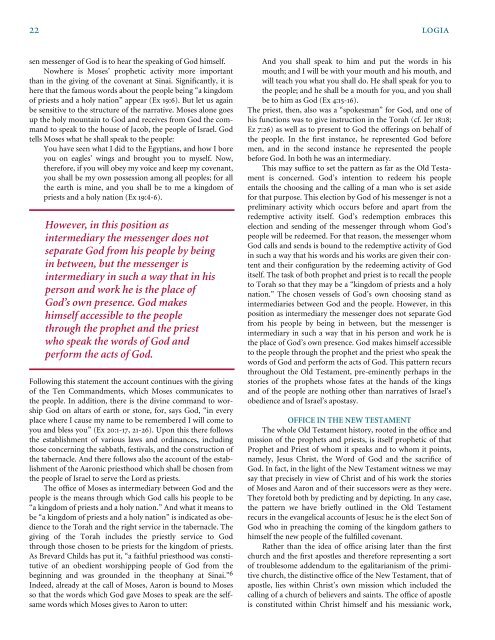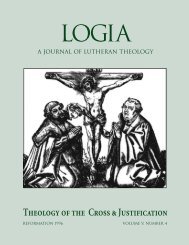Create successful ePaper yourself
Turn your PDF publications into a flip-book with our unique Google optimized e-Paper software.
22 logia<br />
sen messenger of God is to hear the speaking of God himself.<br />
Nowhere is Moses’ prophetic activity more important<br />
than in the giving of the covenant at Sinai. Significantly, it is<br />
here that the famous words about the people being “a kingdom<br />
of priests and a holy nation” appear (Ex 19:6). But let us again<br />
be sensitive to the structure of the narrative. Moses alone goes<br />
up the holy mountain to God and receives from God the command<br />
to speak to the house of Jacob, the people of Israel. God<br />
tells Moses what he shall speak to the people:<br />
You have seen what I did to the Egyptians, and how I bore<br />
you on eagles’ wings and brought you to myself. Now,<br />
therefore, if you will obey my voice and keep my covenant,<br />
you shall be my own possession among all peoples; for all<br />
the earth is mine, and you shall be to me a kingdom of<br />
priests and a holy nation (Ex 19:4-6).<br />
However, in this position as<br />
intermediary the messenger does not<br />
separate God from his people by being<br />
in between, but the messenger is<br />
intermediary in such a way that in his<br />
person and work he is the place of<br />
God’s own presence. God makes<br />
himself accessible to the people<br />
through the prophet and the priest<br />
who speak the words of God and<br />
perform the acts of God.<br />
Following this statement the account continues with the giving<br />
of the Ten Commandments, which Moses communicates to<br />
the people. In addition, there is the divine command to worship<br />
God on altars of earth or stone, for, says God, “in every<br />
place where I cause my name to be remembered I will come to<br />
you and bless you” (Ex 20:1-17, 21-26). Upon this there follows<br />
the establishment of various laws and ordinances, including<br />
those concerning the sabbath, festivals, and the construction of<br />
the tabernacle. And there follows also the account of the establishment<br />
of the Aaronic priesthood which shall be chosen from<br />
the people of Israel to serve the Lord as priests.<br />
<strong>The</strong> office of Moses as intermediary between God and the<br />
people is the means through which God calls his people to be<br />
“a kingdom of priests and a holy nation.” And what it means to<br />
be “a kingdom of priests and a holy nation” is indicated as obedience<br />
to the Torah and the right service in the tabernacle. <strong>The</strong><br />
giving of the Torah includes the priestly service to God<br />
through those chosen to be priests for the kingdom of priests.<br />
As Brevard Childs has put it, “a faithful priesthood was constitutive<br />
of an obedient worshipping people of God from the<br />
beginning and was grounded in the theophany at Sinai.” 6<br />
Indeed, already at the call of Moses, Aaron is bound to Moses<br />
so that the words which God gave Moses to speak are the selfsame<br />
words which Moses gives to Aaron to utter:<br />
And you shall speak to him and put the words in his<br />
mouth; and I will be with your mouth and his mouth, and<br />
will teach you what you shall do. He shall speak for you to<br />
the people; and he shall be a mouth for you, and you shall<br />
be to him as God (Ex 4:15-16).<br />
<strong>The</strong> priest, then, also was a “spokesman” for God, and one of<br />
his functions was to give instruction in the Torah (cf. Jer 18:18;<br />
Ez 7:26) as well as to present to God the offerings on behalf of<br />
the people. In the first instance, he represented God before<br />
men, and in the second instance he represented the people<br />
before God. In both he was an intermediary.<br />
This may suffice to set the pattern as far as the Old Testament<br />
is concerned. God’s intention to redeem his people<br />
entails the choosing and the calling of a man who is set aside<br />
for that purpose. This election by God of his messenger is not a<br />
preliminary activity which occurs before and apart from the<br />
redemptive activity itself. God’s redemption embraces this<br />
election and sending of the messenger through whom God’s<br />
people will be redeemed. For that reason, the messenger whom<br />
God calls and sends is bound to the redemptive activity of God<br />
in such a way that his words and his works are given their content<br />
and their configuration by the redeeming activity of God<br />
itself. <strong>The</strong> task of both prophet and priest is to recall the people<br />
to Torah so that they may be a “kingdom of priests and a holy<br />
nation.” <strong>The</strong> chosen vessels of God’s own choosing stand as<br />
intermediaries between God and the people. However, in this<br />
position as intermediary the messenger does not separate God<br />
from his people by being in between, but the messenger is<br />
intermediary in such a way that in his person and work he is<br />
the place of God’s own presence. God makes himself accessible<br />
to the people through the prophet and the priest who speak the<br />
words of God and perform the acts of God. This pattern recurs<br />
throughout the Old Testament, pre-eminently perhaps in the<br />
stories of the prophets whose fates at the hands of the kings<br />
and of the people are nothing other than narratives of Israel’s<br />
obedience and of Israel’s apostasy.<br />
OFFICE IN THE NEW TESTAMENT<br />
<strong>The</strong> whole Old Testament history, rooted in the office and<br />
mission of the prophets and priests, is itself prophetic of that<br />
Prophet and Priest of whom it speaks and to whom it points,<br />
namely, Jesus Christ, the Word of God and the sacrifice of<br />
God. In fact, in the light of the New Testament witness we may<br />
say that precisely in view of Christ and of his work the stories<br />
of Moses and Aaron and of their successors were as they were.<br />
<strong>The</strong>y foretold both by predicting and by depicting. In any case,<br />
the pattern we have briefly outlined in the Old Testament<br />
recurs in the evangelical accounts of Jesus: he is the elect Son of<br />
God who in preaching the coming of the kingdom gathers to<br />
himself the new people of the fulfilled covenant.<br />
Rather than the idea of office arising later than the first<br />
church and the first apostles and therefore representing a sort<br />
of troublesome addendum to the egalitarianism of the primitive<br />
church, the distinctive office of the New Testament, that of<br />
apostle, lies within Christ’s own mission which included the<br />
calling of a church of believers and saints. <strong>The</strong> office of apostle<br />
is constituted within Christ himself and his messianic work,

















